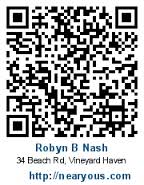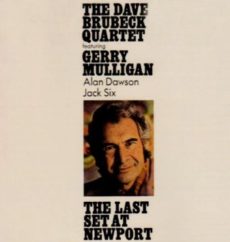
Daily Dose Of Jazz…
Jack Six was born on July 26, 1930 in Danville, Illinois. He studied trumpet between 1945-1947 and worked in Chicago, Los Angeles and New York City where he spent a year studying composition at the Juilliard School in 1955.
As a bassist he played in the Tommy Dorsey Ghost Band led by Warren Covington, then in the big bands of Claude Thornhill and Woody Herman while he continued his studies. He spent several years in groups led by Herbie Mann and also Don Elliott . From 1968 to 1974 he was a part of the Dave Brubeck Trio with drummer Alan Dawson and this tenure Jack followed with Jim Hall.
After a few years in television shows and the musical director of a hotel band from 1989-1998, Six returned to work with Brubeck on tour. Over the course of a forty year career he recorded some 77 jazz sessions with Maxwell Davis,Tal Farlow, Jack Reilly, Dave Pike, Marlene Verplanck, Gerry Mulligan, Susannah McCorkle, Dick Meldonian, Johnny Rae’s Afro-Jazz Septet, Marco Di Marco and Marty Grosz among numerous others.
Bassist Jack Six, a consummate sideman who never led his own recording session, passed away on February 24, 2015.
![]()
#preserving genius
More Posts: bass
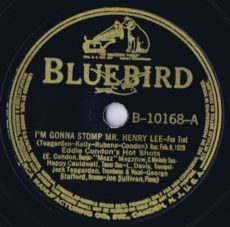
Daily Dose Of Jazz…
Happy Caldwell was born Albert W. Caldwell on July 25, 1903 in Chicago, Illinois. He began on clarinet at age 16, playing in the Eighth Illinois Regimental Band and soon after in an Army band. He studied to be a pharmacist but eventually gave up his medicinal studies for jazz.
He worked with Bernie Young early in the 1920s in Chicago, where he recorded for the first time in 1923 and began doubling on tenor saxophone. In the middle of the 1920s he played with Mamie Smith’s Jazz Hounds, Bobby Brown’s Syncopaters, Elmer Snowden, Billy Fowler, Thomas Morris, Willie Gant, and Cliff Jackson. By 1929 he had recorded with Louis Armstrong.
The 1930s saw him playing with Vernon Andrade, Tiny Bradshaw, and Louis Metcalfe, and leading his own band, the Happy Pals. He played at Minton’s in New York City for a short time before moving to Philadelphia, where he played with Eugene Slappy and Charlie Gaines. Returning to New York he put together a new ensemble in the Forties and continued to work in small settings for several decades. In the 1970s he played with Jimmy Rushing, including on international tours. Never leading his own sessions, clarinetist and tenor saxophonist Happy Caldwell, sometimes misspelled as Cauldwell, passed away on December 29, 1978 in New York City at age 75.
![]()
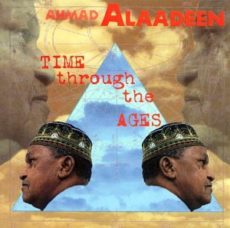
Daily Dose Of Jazz…
Ahmad Alaadeen was born in Kansas City, on July 24, 1934 and grew up listening to all styles of music not limited to the Philharmonic, Lester Young, T-Bone Walker and Eddie “Cleanhead” Vinson. He began playing the saxophone when he was in sixth grade, in time mastering flute, clarinet and oboe. He studied at R.T. Coles High School under the tutelage of Leo H. Davis, a well respected music instructor reported to have taught Charlie Parker.
Alaadeen debuted as a professional with Davis’ concert band playing e-flat horn when he was 14 and his first major job was playing baritone sax with pianist-bandleader Jay McShann. In later years he would rejoin McShann on tenor. He studied at the Kansas City Conservatory of Music, St. Mary’s University and DePaul University. Serving in the military during 1957-59, being the jazz saxophonist and principal oboist with the 4th Army Band, after his discharge he spent time in Chicago, playing in a program led by pianist-composer Richard Abrams that was the beginning of the AACM – the Association for the Advancement of Creative Musicians that included members Lester Bowie and Malachi Favors.
Returning to Kansas City, Ahmad continued to play, teach and lead the Deans of Swing in the 1990s, and the ensemble was picked in 1996 as Musician Magazine’s Best Unsigned Band. He started the ASR label to document his music, was awarded the Kansas City’s Jazz Heritage Award, the Missouri Humanities Council’s Community Heritage Award, the Missouri Arts Award and Kansas City’s Lifetime Achievement Award. Saxophonist, composer and educator Ahmad Alaadeen, whose swing and hard bop style passed away of cancer on August 15, 2010 at the age of 76.
Sponsored By
![]()
More Posts: saxophone
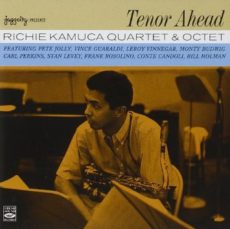
Daily Dose Of Jazz…
Richard “Richie” Kamuca was born on July 23, 1930 in Philadelphia, Pennsylvania. His early playing, in what is generally considered the Lester Young style, was done on tour with the big bands of Stan Kenton and Woody Herman, where he became a member of the later line-ups of Herman’s Four Brothers saxophone section with Al Cohn and Bill Perkins.
Like many players associated with West Coast jazz, he grew up in the East before moving West around the time that bebop changed the prevailing style of jazz. Kamuca stayed on the West Coast, playing with the smaller groups of Chet Baker, Maynard Ferguson, Shorty Rogers, Bud Shank, Bill Holman, Conte Candoli, Frank Rosolino and others. He was one of the Lighthouse All-Stars, and recorded with Perkins, Art Pepper, Jimmy Rowles, Cy Touff, Jimmy Giuffre, Gary McFarland, The Modern Jazz Quartet and many others, as well as leading recording sessions in his own right.
Kamuca was a member of the group Shelly Manne and His Men from 1959 through 1962, when he returned East and settled in New York City. Here he worked with Gerry Mulligan, Gary McFarland, and Roy Eldridge before returning to the West Coast in 1972, where he recorded in the studios and performed with local groups.
Less well known to the general public than other saxophonists, Richie Kamuca passed away of cancer, in Los Angeles, California on July 22, 1977 just before his 47th birthday.
![]()
More Posts: saxophone
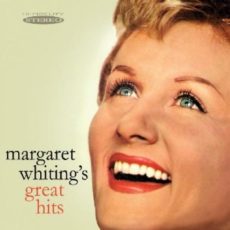
Daily Dose Of Jazz…
Margaret Eleanor Whiting was born in Detroit, Michigan on July 22, 1924 and her father Richard wrote popular hits such as Hooray for Hollywood, Ain’t We Got Fun? and On the Good Ship Lollipop. In 1929 when she was five years old, her family moved to Los Angeles.
In her childhood, Whiting’s singing ability had already been noticed, and at the age of only seven she sang for singer-lyricist Johnny Mercer, with whom her father had collaborated on Too Marvelous for Words. In 1942, Mercer co-founded Capitol Records and signed her to one of Capitol’s first recording contracts.
In the early years of her career Margaret would work with Freddie Slack and His Orchestra, Billy Butterfield’s Orchestra and Paul Weston and His Orchestra. By 1945 she began to record under her own name with songs like All Through The Day, In Love In Vain, Baby It’s Cold Outside and A Tree In The Meadow. She would work with Jimmy Wakely, Johnny Mercer, Bob Hope and Strange Sounding Names. Through to the mid-1950s she recorded for Capitol, but as hits waned she switched to Dot Records, then Verve Records, returned to Capitol in the early 1960s and finally signing with London Records by 1966. Her final solo albums were made for Audiophile in the Eighties and DRG Records in 1991. Her distinguished conductors and musical arrangers through the years included Buddy Bregman, Frank DeVol, Russell Garcia, Johnny Mandel, Billy May, Marty Paich, Nelson Riddle, Pete Rugolo, and Paul Weston.
Whiting would go on to co-star on the 15-minute radio musical programs The Jack Smith Show and Club Fifteen. She was a vocalist on The Eddie Cantor Show, was in the cast of The Philip Morris Follies of 1946 and The Railroad Hour. She was hostess on the Spotlight Revue and a featured singer on the transcribed Barry Wood Show and was casted as a young Sophie Tucker, in the Lux Radio Theater production No Time For Heartaches.
With her sister Barbara they starred as themselves in the CBS sitcom Those Whiting Girls produced by Desilu Productions, and was a regular over the years on tv variety shows The Big Record, The Bob Hope Show, The Colgate Comedy Hour, The David Frost Show, The Ed Sullivan Show, The George Jessel Show, The Jonathan Winters Show, The Merv Griffin Show, The Mike Douglas Show, The Nat King Cole Show, The Patti Page Show, The Red Skelton Hour, The Steve Allen Show, The Ford Show Starring Tennessee Ernie Ford, and The Tonight Show Starring Johnny Carson, among numerous others.
In the 2000s, Whiting was cast in several documentaries about singers and songwriters of her era, including Judy Garland: By Myself, Fever: The Music of Peggy Lee, Anita O’Day: The Life of a Jazz Singer, Johnny Mercer: The Dream’s on Me, The Andrews Sisters: Queens of the Music Machines and Michael Feinstein’s American Songbook.
Vocalist Margaret Whiting, who made her reputation during the 1940s & 50s, passed away of natural causes on January 10, 2011.
![]()
More Posts: vocal



